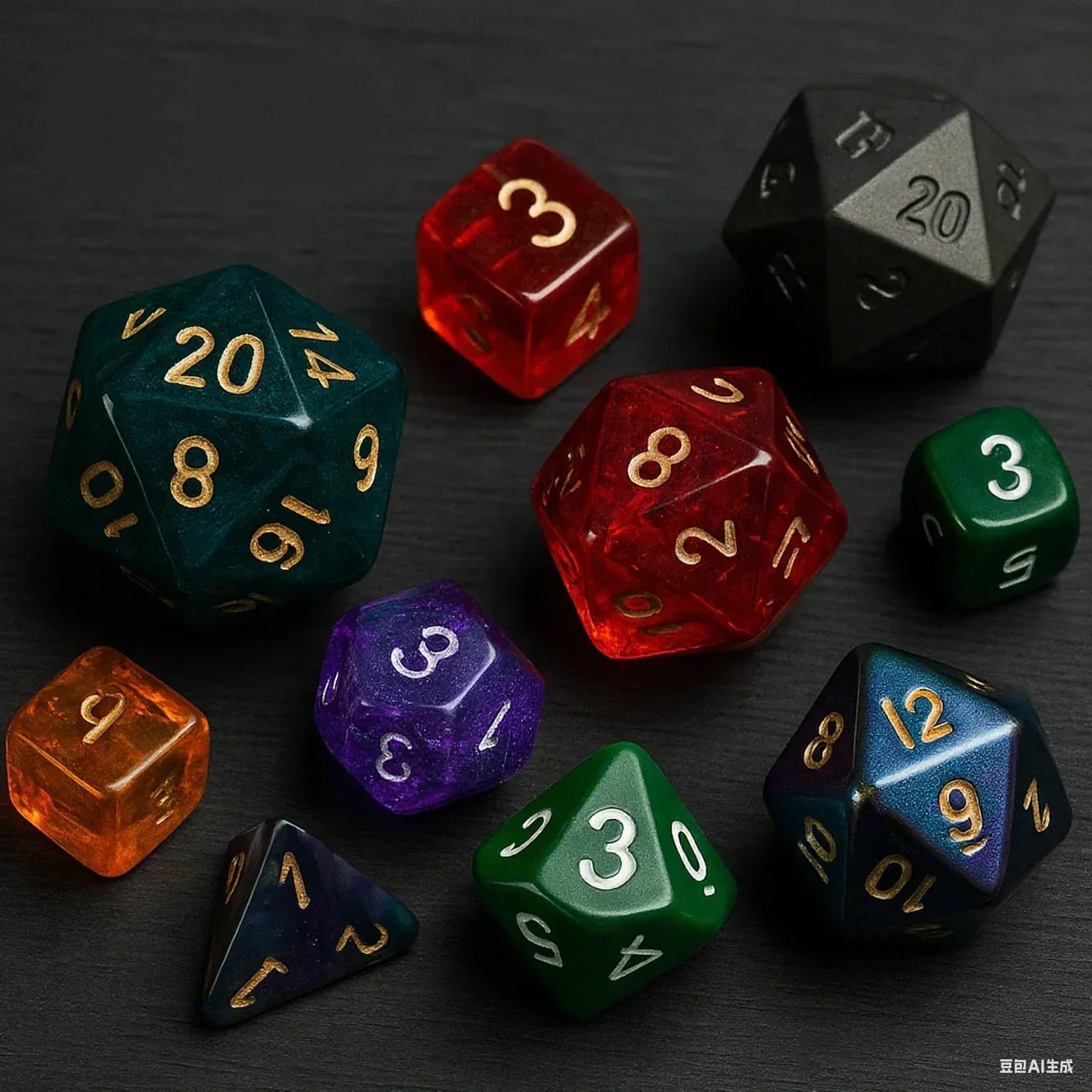Table of Contents
Many newcomers to tabletop games and RPGs often ask a seemingly simple but crucial question:
Buying too few means you'll have to take turns borrowing dice, which slows down the pace and disrupts the atmosphere. Buying too many can be a waste of money. Today, we'll explain this issue thoroughly, allowing you to buy the right number of dice for your needs and help you choose based on different RPG scenarios.
Why You Should Care About the Number of D10 Dice
Don't underestimate the importance of the number of dice. If you're not prepared, your gaming experience will be significantly reduced:
-
The rhythm will be disrupted: Taking turns borrowing dice not only wastes time but also makes the game less enjoyable.
-
The ritual of rolling the dice will be diminished: When you're about to roll a large handful of dice at once, only to find you only have half the dice, the excitement is gone.
-
It Impacts Judgment and Strategy: Rolling all the dice at once is more intuitive and easier to calculate than rolling them several times.
-
Multiplayer games are more convenient: If you're the DM, you'll need multiple RPG dice to handle checks against various NPCs and monsters.
In short: more dice means smoother gameplay.
Basic Uses of D10 Dice
A D10 is a 10-sided die, typically numbered 0–9, with 0 representing 10. Common uses for D10 dice in D&D and other RPGs are numerous:
- Normal Checks: When attacking, casting spells, or using skills, a character rolls 1–2 D10s. Success is determined by adding a modifier to the result.
- Percentage Checks: Use a percentage die (marked with 00, 10, 20, 30, 40, 50, 60, 70, 80, or 90) and a regular D10. Combining the two dice gives a result of 1–100. These are often used for luck checks, triggering random events, and more.
👉 If you're still not completely sure how to read a D10, check out our detailed guide to D10 dice reading.
- Dice pool gameplay: Some systems require you to roll multiple D10s at once based on skill levels or attribute scores, to see how many meet the required criteria. For example, World of Darkness might roll 8–12 D10s at a time, while certain scenes in Vampire: The Masquerade may require 15+.
- Damage calculation: Some weapons or spells use multiple D10s for damage, such as 8d10 for a fireball or 4d10 for a giant weapon critical hit.
D10 Dice Requirements for Different Gameplay Styles
The number of D10 dice required varies greatly across RPG systems, depending on the type of game you're playing, the character you're playing, and the combat scenario you're in.
 If you're playing a light-weight game, like the fighter, paladin, and ranger in Dungeons & Dragons (DND), these classes use d10 hit dice, which are typically used to regenerate health during long rests. In combat, d10s are also commonly used for damage rolls with certain weapons, such as longswords and heavy crossbows. This type of gameplay typically requires only 1–2 d10s per roll, with occasional percentage dice used for random events, so 2–4 should be sufficient for the entire game.
If you're playing a light-weight game, like the fighter, paladin, and ranger in Dungeons & Dragons (DND), these classes use d10 hit dice, which are typically used to regenerate health during long rests. In combat, d10s are also commonly used for damage rolls with certain weapons, such as longswords and heavy crossbows. This type of gameplay typically requires only 1–2 d10s per roll, with occasional percentage dice used for random events, so 2–4 should be sufficient for the entire game.
Moderate demands are more common in custom rules with dice pools or in gameplay that incorporates skill challenges. For example, in some Homebrew systems, your wizard might need to roll 8 d10s to calculate damage for a high-level spell, or a large-scale group check during a boss fight. If you only have 4–5 dice, you'll have to roll them twice, disrupting the rhythm and savoring the thrill of a single, decisive battle. Ten dice are a comfortable option for this style of play, ensuring a smooth flow of combat.
As for re-dice pool systems, dark-themed RPGs like World of Darkness or Vampire: The Masquerade offer a completely different experience. Each player action may require rolling 15–20 dice at once. For example, a vampire's stealth, social, and combat checks directly draw upon the character's attributes and skill points to form a massive dice pool. If you don't have enough dice, the ritual of "pushing a bunch of dice onto the table" is lost. Therefore, for this type of gameplay, players are generally advised to prepare 20–30 dice, or even more.
D10 Dice Requirement Chart
| RPG Type/Playstyle | Common D10 Usage | Recommended Amount |
|---|---|---|
| Light Playstyle (D&D, Basic Checks) | 1–2 D10s | 2–4 D10 dice |
| Medium D10 Dice (Skill Challenges) | 5–10 D10s | 10 D10 dice |
| Reloaded Dice Pool Systems | 15–20 D10s | 20–30 D10 dice |
How to Calculate the Number of D10s
The method is simple: first, determine the maximum number of D10s you can roll at once in your system. Then, prepare 1–2 extra D10s as a backup. This way, whether you're facing a tense boss battle or unexpectedly triggering a large check, you can complete the roll in one go without interruption.
If you're still short on the right number of dice, you can choose single D10s, sets of three, or sets of 10 D10s here to flexibly fill your needs based on your playstyle. It's convenient and practical.
What are the requirements for good D10 dice?
For players, good D10 dice have several common characteristics:
- Clear numbers: Deep markings and strong color contrast make it easy to read the results at a glance, especially important in a dimly lit gaming environment.
- Smooth feel: Rounded edges eliminate burrs when thrown, and balanced weight ensures randomness.
- Appealing Appearance: Available in transparent, liquid-core, acrylic, and metal materials, they are more than just tools; they become "trophies" on the table.
- Flexible quantity: Single, several, or small sets allow players to add to their dice according to their playstyle without having to stock up all at once.
When preparing dice, we usually buy a core set based on our playstyle, then gradually add to it based on different activities and systems. This saves money and ensures we have enough dice for various scenarios.
Summary
For light play: 2–4 D10s are sufficient.
For medium play: 10 dice are the most comfortable and easy to roll all at once.
Re-dice pool system: 20–30 dice to ensure a smooth gameplay rhythm.
Preparing dice is like preparing equipment for an adventure: just enough is enough, but having a few extras for crucial moments can definitely help you gain a little extra luck. Before you begin, check your D10 dice pool. If you're short, choose a set of D10 dice from the D10 Dice shop to ensure a smooth RPG adventure from start to finish.



